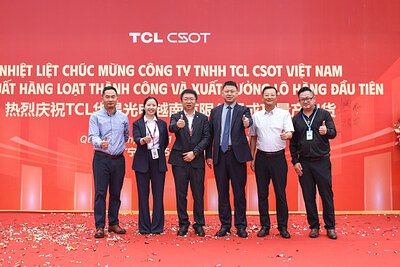
TCL CSOT Vietnam Factory Signals Shift in Display Manufacturing, Eyes Growing Market
TCL CSOT’s new Vietnam factory boosts production capacity and highlights a strategic move in the global display market. But how does it impact competition and ethical sourcing?
TCL CSOT Vietnam Factory Signals Shift in Display Manufacturing, Eyes Growing Market
Quang Ninh Province, Vietnam – TCL China Star Optoelectronics Technology (TCL CSOT) officially launched its new IT display module factory in Quang Ninh province this week, a move signaling a strategic shift in the global display manufacturing landscape. The $310 million (projected to $590 million by 2027) facility, boasting an annual capacity of 4.8 million units, aims to bolster the company’s position in the rapidly growing monitor and laptop display market. But the expansion isn't happening in a vacuum, raising questions about competitive pressures, supply chain diversification, and the company's commitment to ethical manufacturing.
A Strategic Move in a Shifting Landscape
The opening of the Vietnam facility is part of a broader trend of manufacturers diversifying their production bases, particularly outside of China. “The geopolitical climate and rising costs are forcing companies to re-evaluate their supply chains,” explains one industry analyst. “Vietnam offers a competitive labor market, a stable political environment, and increasingly sophisticated infrastructure.” TCL CSOT’s decision is further amplified by a growing demand for IT displays, fueled by remote work, gaming, and increasing digitalization.
“We are committed to meeting the growing needs of our customers with high-quality products and responsive service,” a company spokesperson stated in a press release. “This new factory is a crucial step in strengthening our global manufacturing network.”
Competition Heats Up
The move is expected to intensify competition among major display manufacturers, including Samsung Display, LG Display, and BOE Technology. Industry experts predict that increased capacity could lead to price adjustments and a focus on innovation to differentiate products. “There will be pressure on all players to streamline operations, reduce costs, and develop cutting-edge display technologies,” says a source familiar with the competitive landscape. “The Vietnam facility gives TCL CSOT a significant advantage in terms of responsiveness and cost-effectiveness.”
While specific market share data for IT display modules remains fragmented, TCL CSOT’s expansion demonstrates a clear ambition to capture a larger share of this lucrative market. The company’s commitment to investing in advanced technologies, such as LCD, OLED, and MLED, further solidifies its position as a key player in the industry.
Vietnam’s Rise as a Manufacturing Hub
The decision to locate the factory in Vietnam is part of a larger trend of foreign direct investment (FDI) flowing into the country. Vietnam’s government has actively courted manufacturers with incentives, streamlined regulations, and a focus on infrastructure development. “Vietnam has become an increasingly attractive destination for manufacturing,” explains a supply chain expert. “It offers a competitive labor market, a stable political environment, and a growing ecosystem of suppliers.”
However, challenges remain. While Vietnam's infrastructure is improving, it still lags behind more developed manufacturing hubs. “There are logistical hurdles and infrastructure limitations that need to be addressed to support continued growth,” says an industry insider. “Investing in transportation, energy, and skilled labor is crucial.”
Commitment to Ethical Manufacturing and Quality Control
TCL CSOT emphasizes its commitment to responsible manufacturing practices, touting its RBA and ISO 9001 certifications for the Vietnam facility. These certifications demonstrate a commitment to ethical sourcing, environmental sustainability, and quality control. “We are committed to upholding the highest standards of ethical and environmental responsibility in all of our operations,” a company representative stated.
However, scrutiny of supply chains continues to increase, with consumers and investors demanding greater transparency and accountability. “Certifications are a good starting point, but they are not enough,” says a human rights advocate. “Companies need to conduct thorough due diligence throughout their supply chains to ensure that workers are treated fairly and that environmental standards are met.”
One anonymous factory worker in a neighboring supply chain company stated, “It's good to see companies talking about ethical sourcing, but it's important to look beyond the certifications and see what's really happening on the ground.”
The company has not responded to requests for independent verification of its supply chain practices.
Looking Ahead
TCL CSOT’s Vietnam factory represents a significant investment in the future of display manufacturing. The facility is expected to create jobs, boost economic growth in the region, and contribute to the development of a more resilient and diversified supply chain.
However, the company faces challenges in a highly competitive market, including rising costs, technological disruptions, and increasing scrutiny of ethical and environmental practices. “Success will depend on the company’s ability to innovate, adapt to changing market conditions, and maintain a strong commitment to responsible manufacturing,” concludes one analyst.
As the demand for IT displays continues to grow, TCL CSOT’s Vietnam factory is poised to play a key role in shaping the future of the industry. The move signals a broader shift in global manufacturing, as companies seek to diversify their supply chains, reduce costs, and respond to evolving consumer demands.
